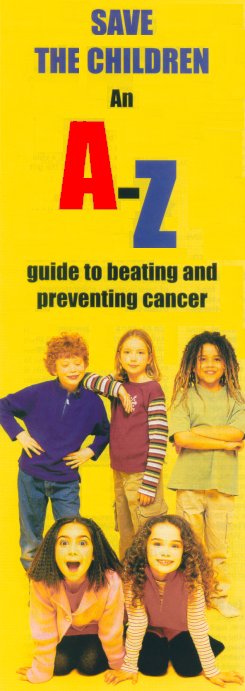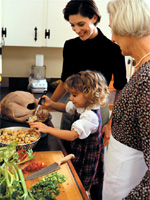Originally published in July 2003 icon

Every parent wants to keep their children safe, happy and healthy. Once they grow up, they make their own decisions, but life-forming eating and health habits start from an early age, so take steps to safeguard your children’s future today.
A: Avoid aspartame- the artificial sweetener, in low-calorie drinks and low fat foods, which has been linked to brain tumours and memory loss - and acrylamides (in most foods baked above 1200C. e.g. crisps, chips, biscuits, breakfast cereals etc). The World Health Organisation says safe levels are zero. Too many antibiotics have been linked to brain tumours or stomach problems. Give them an acidophilus supplement after a course, as without this they may develop fungal growths in the gut and these are linked to a variety of cancers especially leukaemia.
B: Babies born in winter have a higher risk of some types of brain cancer, according to Cancer Research UK. There is tentative evidence that this is brought on by bacterial or viral infections that are more common in winter months.
C: Cook at lower temperatures, and don’t barbecue or fry. Barbecue smoke or flames add carcinogenic nitrosamines to the food; regular eaters of fried food have three times the level of cancers.
D: Diesel fumes are the third largest cause of lung cancer, so don’t live near a main road. Dairy is implicated in late-onset diabetes - now up to 11% in children under 12!!
E: Eliminate household toxins. Make bath times safer with toxin-free shampoos and bubble baths. Dump chemical air fresheners and don’t shake and vac!
F: Fish oils,
as your grandma told you, are excellent for growing brains and health. lQ levels 11% higher are noted in children who take fish oils daily and the fish oil factor helps in brain development before children are born, so take a supplement during pregnancy, if you can’t face sardine sarnies. Omega 3 also stores in tissues and protects against many cancers.
G: Gaining too much weight in childhood increases chances of cancer in adulthood. Sixty per cent of 16 year olds are overweight or obese. Get your children off the sofa, away from the computer and out into the fresh air.
H: Hunger binges on crisps, chocolates, pizzas, chips and takeaways store up fat and health problems for your children. Try to give them a big breakfast and lunch and, if they still want to snack, put out sliced apples, oranges, apricots or bananas to munch in front of the TV. A bowl of seeds (pumpkin, sunflower and sesame) makes a great healthy alternative to crisps.
 I: Insulin
I: Insulin. Another reason to bin fizzy drinks. Studies have shown that sugars, refined foods (like pasta and pizza) and high carbohydrate meals cause insulin levels to soar and that inappropriate levels of insulin in pubertal children (during breast development) can lead to lesions, which could later become cancerous. A similar process could explain the increase in testicular and prostate cancer. Diabetes also increases the risk of pancreatic cancer. Worse, new research from the USA implicates hydrogenated vegetable oil (fast food and processed foods) and even dairy.
Kick all these out of your child’s life.J: Juicing. Now there’s plenty of summer fruit around, teach your children how to use a juicer and they’ll never want a fizzy drink again.
K: Kick a ball around, take them swimming or take them for cycle rides. Move the lymph, as it takes away toxins from the cells and fill their lungs with fresh air.
L: Laugh out loud with your children. Enjoy special outings and treats. Strong family units can cope with anything.
M: Mobile phone use has been linked to brain tumours. More tests are underway, but if you’ve already bought one for your child, fit a shield. Don’t live near mobile masts or electricity pylons either.
N: Nitrite-dyed hotdogs can lead to childhood cancers. Added for colouring purposes, nitrites react with natural chemicals in meat to form a potent carcinogen nitrosamine.
O: Organic. Grow or pick your own fruit and veg whenever possible. If you haven’t a garden, visit a pick-your-own farm during the summer months. Children love eating fruit, yes, and veg, too, if they’ve picked it themselves. Buy organic meat and fish. Children are especially prone to toxic attack from herbicides and pesticides - far more than adults are.
 Strong family units can cope with anything
Strong family units can cope with anything
P: Put away all pet flea collars, and home and garden pesticides. Studies have shown they have strong associations with non-Hodgkin’s lymphoma, leukaemia and brain cancer. Pregnant women should avoid using perfumed products -Swedish research shows they can cause high levels of DEHP in the blood stream and are linked with genital problems and even with testicular cancer in male babies.
Q: Quit smoking. In one study, cotinine levels in the saliva of children, where both parents smoke, showed that children were receiving a nicotine equivalent of smoking 80 cigarettes a year. Girls who smoke in their "formative" years, or start their periods early and go on the Pill increase their risk of breast cancer later in life.
R: Ritalin has been shown to induce highly aggressive rare liver cancers in rodents, so why give it to children with ADD (Attention Deficit Disorder), when cutting out sugars and E numbers and giving children fish oils and a good mineral and vitamin supplement can help instead?
S: Salt (sodium) poisons cells and creates the environment for cancer. The FSA says your kids should eat no more than 3gms a day - we say 1gm!! A burger and fries meal contains 4g of salt. Even one sausage or one slice of bacon can give them too much sodium for a day. They will also get their daily maximum from four slices of bread or a bowl of breakfast cereal.
T: Think positively and help children destress. School and peer pressures pile on the worry. Talk about it. Psychiatrists have found that people with a negative outlook may be up to 25 per cent more likely to develop cancer than those who are more optimistic.
U: Ultraviolet rays. Keep your teenagers away from sun beds. Under 18s are banned from using them in France and no wonder, as the chances of developing a tumour increase by up to 20 per cent per decade of sun bed use before the age of 56. In the sun, slip on a shirt, slap on a hat and slop on the sun screen, as skin cancer is the UK’s second most common form of cancer and is seemingly "formed" in the childhood years.
V: Vitamin C protects children against the harmful effects of free radicals. Yet 47 per cent of children do not eat a vegetable other than a potato in an average week; and children who don’t eat fruit are highly likely to get a cancer later in life.

W:Water, water everywhere... and, if you want your children to have the best, pure water, consider installing a reverse osmosis filter!
X: Xrays. Avoid having too many. Studies are underway to see if they cause cancer.
Y: Young parents are less likely to have children with the most common form of leukaemia, ALL. Scientists at the Childhood Cancer Research Group in Oxford found that mothers between the ages of 35 and 39 were 30 per cent more likely to have a child with ALL than one aged 25 to 29. The risk rises to 88 per cent for mothers of 40 or over.
Z: Zen. Teach children the value of quiet time and meditation to recharge their systems. Never put computers in a bedroom (they give off toxins) and don’t let them sleep near TVs. EMFs can damage melatonin levels